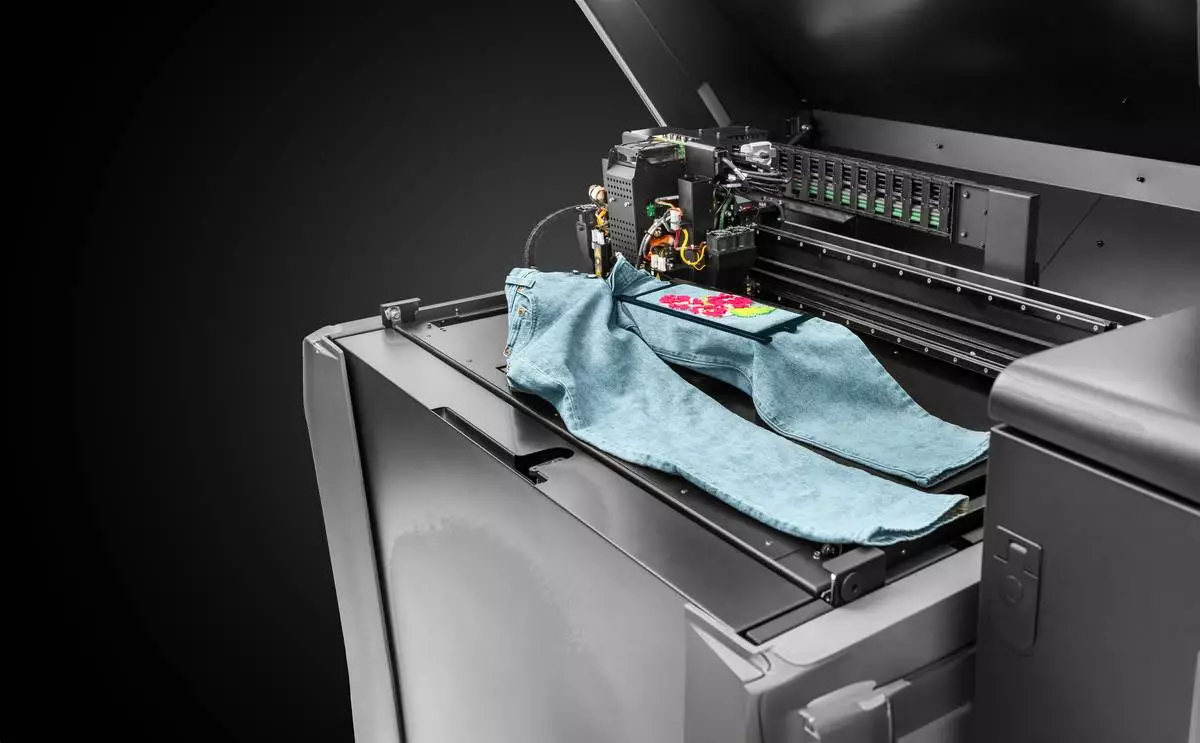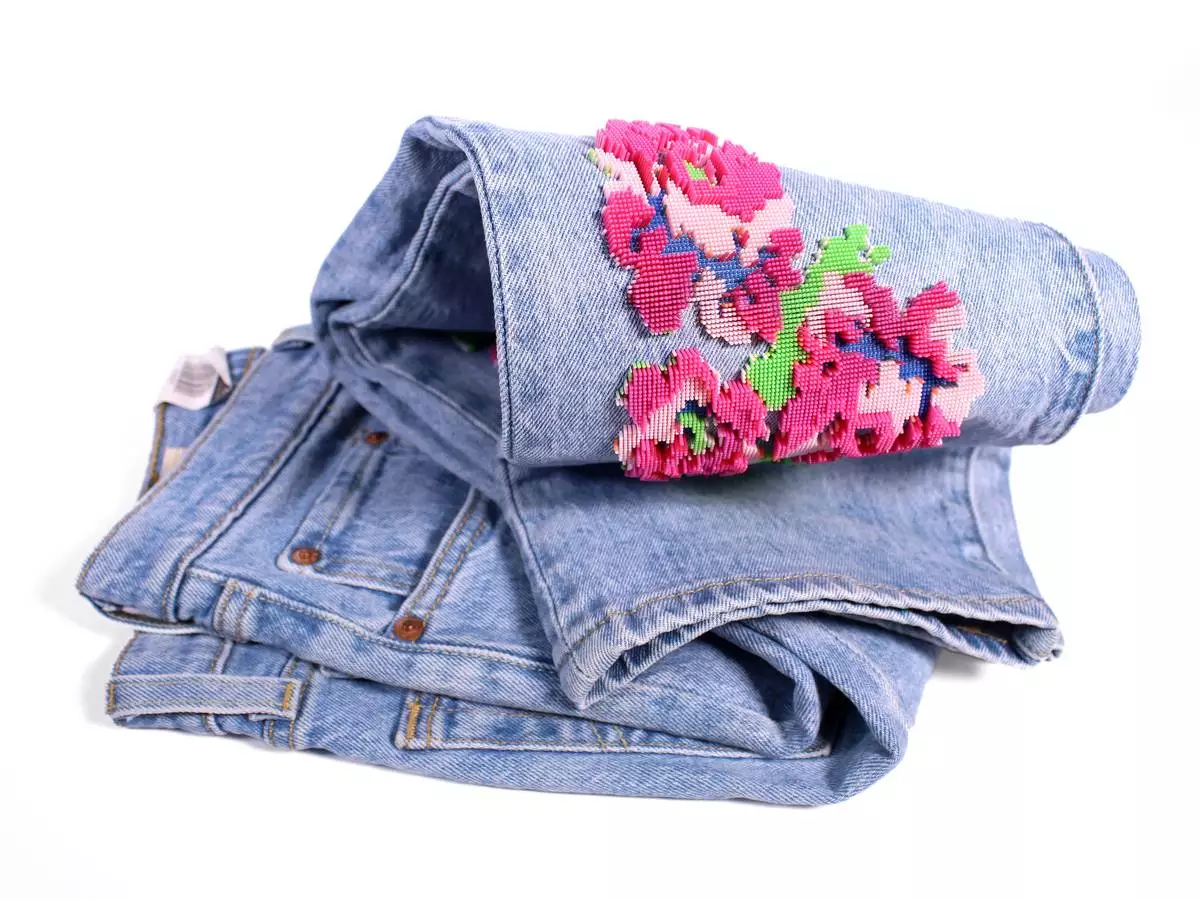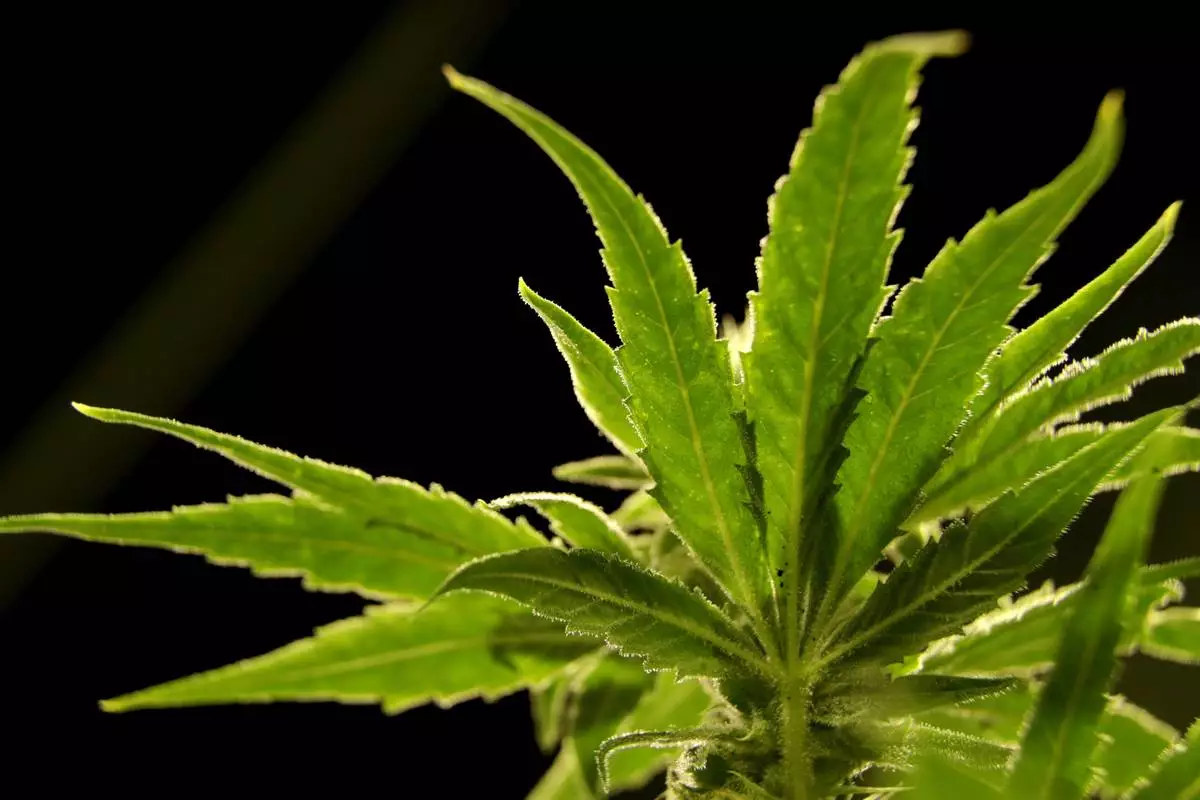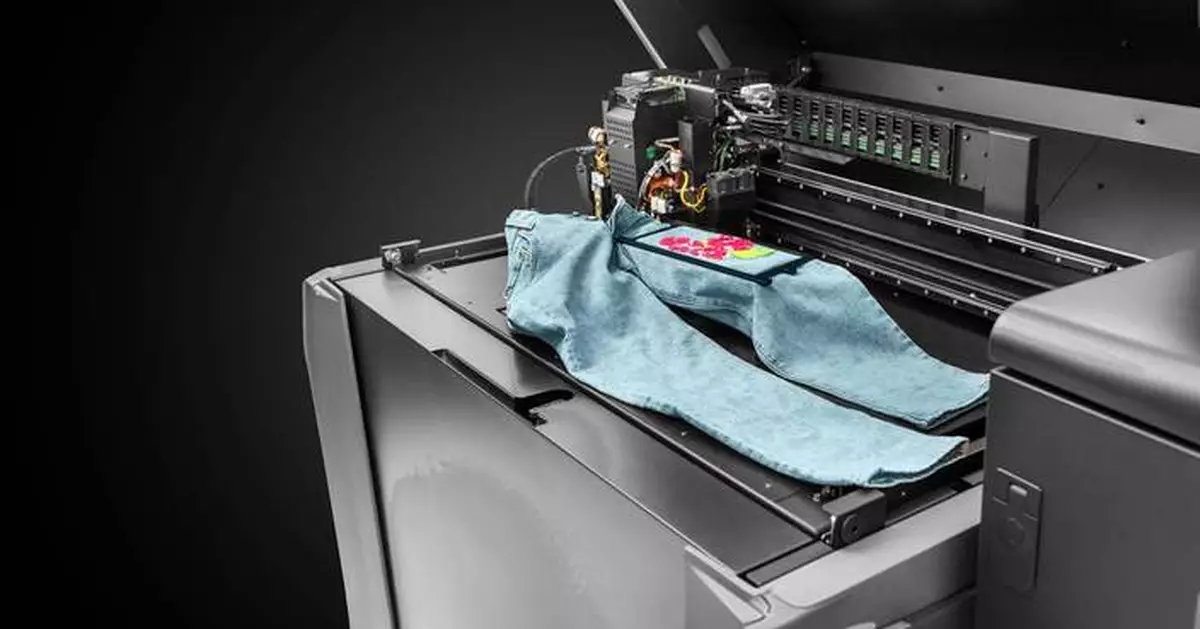EDEN PRAIRIE, Minn. & REHOVOT, Israel--(BUSINESS WIRE)--Apr 17, 2024--
In a bold move that redefines the future of personalized fashion and sustainability, Stratasys Ltd. (NASDAQ: SSYS) today announced the launch of its Direct-to-Garment (D2G) solution for the J850 TechStyle™ printer, the newest offering in the Stratasys 3DFashion™ direct-to-textile printing technology. The first example of its application is an Urban Tattoo denim collection which will be revealed at the Texprocess exhibition in Frankfurt, Germany on April 23.
This press release features multimedia. View the full release here: https://www.businesswire.com/news/home/20240417072855/en/
The D2G solution is ideal for customization and personalization by enabling the application of full color multi-material 3D print directly on fully assembled garments of various fabric types including denim, cotton, polyester, and linen. It allows fashion brands to facilitate personalized and bespoke designs for customers, including the ability to tailor 3D prints according to individual preferences, sizes, and styles.
“Many brands are limited in how much they can mass produce denim clothing, while maintaining a level of personalization that has meaning to the wearer,” said Zehavit Reisin, Senior Vice President Commercial Solutions, Stratasys. “We are giving brands the opportunity to do something remarkable, to bring more character to their clothing line, while pushing a more sustainable business practice that appeals to multiple audiences across the consumer spectrum.”
Available in two sizes, the D2G tray kits facilitate the personalization of garments ranging from jeans to jackets, enabling designers and manufacturers to adopt more sustainable practices by reducing material waste. The seamless workflow delivers ease of calibration and compatibility with various garment sizes, streamlining the production process and fostering the creation of unique, personalized apparel.
Demonstrating this innovation, the Urban Tattoo collection showcases the potential and the ease of direct-to-garment 3D printing. Working with noted designers Karim Rashid, Travis Fitch, Zlatko Yanakiev at Meshroom along with Foraeva Studio, this distinctive collection shows the transformation of ordinary garments into extraordinary pieces of wearable art, imbuing them with personal identity and meaning.
Like body tattoos, Urban Tattoos promote a deeper emotional connection, encouraging the upcycling of existing garments and contributing to a more sustainable fashion ecosystem. This aligns with Stratasys’ strategy for Mindful Manufacturing™. Stratasys has been able to create a new collection that will appeal to multiple brands that reach across diverse socio-economic backgrounds.
"With Urban Tattoos, we're not just decorating a garment, we're giving it more life and spirit,” said Naomi Kaempfer, Stratasys Creative Director. “By adding layers of stories and symbolism that resonate with the individuality of the wearer, these tattoos help consumers promote their identity, and celebrate their individuality. It is a testament to the transformative power of additive manufacturing technology in fashion."
For more information about Stratasys 3DFashion ™ technology, visit the website.
More information about sustainable Mindful Manufacturing, including an AMGTA Life Cycle Inventory and Research that reveals the benefits of our 3D Printing technology for streamlined fashion production, is available here.
About Stratasys
Stratasys is leading the global shift to additive manufacturing with innovative 3D printing solutions for industries such as aerospace, automotive, consumer products and healthcare. Through smart and connected 3D printers, polymer materials, a software ecosystem, and parts on demand, Stratasys solutions deliver competitive advantages at every stage in the product value chain. The world’s leading organizations turn to Stratasys to transform product design, bring agility to manufacturing and supply chains, and improve patient care.
To learn more about Stratasys, visit www.stratasys.com, the Stratasys blog, Twitter, LinkedIn, or Facebook. Stratasys reserves the right to utilize any of the foregoing social media platforms, including Stratasys’ websites, to share material, non-public information pursuant to the SEC’s Regulation FD. To the extent necessary and mandated by applicable law, Stratasys will also include such information in its public disclosure filings.
Stratasys, J850, TechStyle and 3DFashion are trademarks or registered trademarks of Stratasys Ltd. and/or its affiliates. All other trademarks are the property of their respective owners


Stratasys announces new Direct-to-Garment solution to enable full-color multi-material 3D printing directly on fully assembled garments. (Photo: Business Wire)

Stratasys announces new Direct-to-Garment solution to enable full-color multi-material 3D printing directly on fully assembled garments. (Photo: Business Wire)
WASHINGTON (AP) — The U.S. Drug Enforcement Administration will move to reclassify marijuana as a less dangerous drug, The Associated Press has learned, a historic shift to generations of American drug policy that could have wide ripple effects across the country.
The DEA’s proposal, which still must be reviewed by the White House Office of Management and Budget, would recognize the medical uses of cannabis and acknowledge it has less potential for abuse than some of the nation’s most dangerous drugs. However, it would not legalize marijuana outright for recreational use.
The agency’s move, confirmed to the AP on Tuesday by five people familiar with the matter who spoke on the condition of anonymity to discuss the sensitive regulatory review, clears the last significant regulatory hurdle before the agency’s biggest policy change in more than 50 years can take effect.
Once OMB signs off, the DEA will take public comment on the plan to move marijuana from its current classification as a Schedule I drug, alongside heroin and LSD. It moves pot to Schedule III, alongside ketamine and some anabolic steroids, following a recommendation from the federal Health and Human Services Department. After the public-comment period the agency would publish the final rule.
It comes after President Joe Biden called for a review of federal marijuana law in October 2022 and moved to pardon thousands of Americans convicted federally of simple possession of the drug. He has also called on governors and local leaders to take similar steps to erase marijuana convictions.
“Criminal records for marijuana use and possession have imposed needless barriers to employment, housing, and educational opportunities,” Biden said in December. “Too many lives have been upended because of our failed approach to marijuana. It’s time that we right these wrongs.”
The election year announcement could help Biden, a Democrat, boost flagging support, particularly among younger voters.
Biden and a growing number of lawmakers from both major political parties have been pushing for the DEA decision as marijuana has become increasingly decriminalized and accepted, particularly by younger people. A Gallup poll last fall found 70% of adults support legalization, the highest level yet recorded by the polling firm and more than double the roughly 30% who backed it in 2000.
Schedule III drugs are still controlled substances and subject to rules and regulations, and people who traffic in them without permission could still face federal criminal prosecution.
Some critics argue the DEA shouldn’t change course on marijuana, saying rescheduling isn’t necessary and could lead to harmful side effects.
Jack Riley, a former deputy administrator of the DEA, said he had concerns about the proposed change because he thinks marijuana remains a possible “gateway drug," one that may lead to the use of other drugs.
“But in terms of us getting clear to use our resources to combat other major drugs, that’s a positive,” Riley said, noting that fentanyl alone accounts for more than 100,000 deaths in the U.S. a year.
On the other end of the spectrum, others argue marijuana should be treated the way alcohol is.
Last week, 21 Democrats led by Senate Majority Leader Sen. Chuck Schumer of New York sent a letter to DEA Administrator Anne Milgram and Attorney General Merrick Garland arguing marijuana should be dropped from the controlled-substances list and instead regulated like alcohol.
“It is time for the DEA to act,” the lawmakers wrote. “Right now, the Administration has the opportunity to resolve more than 50 years of failed, racially discriminatory marijuana policy.”
Federal drug policy has lagged behind many states in recent years, with 38 having already legalized medical marijuana and 24 legalizing its recreational use.
That’s helped fuel fast growth in the marijuana industry, with an estimated worth of nearly $30 billion. Easing federal regulations could reduce the tax burden that can be 70% or more for businesses, according to industry groups. It could also make it easier to research marijuana, since it’s very difficult to conduct authorized clinical studies on Schedule I substances.
The immediate effect of rescheduling on the nation’s criminal justice system would likely be more muted, since federal prosecutions for simple possession have been fairly rare in recent years.
But loosening restrictions could carry a host of unintended consequences in the drug war and beyond.
Critics point out that as a Schedule III drug, marijuana would remain regulated by the DEA. That means the roughly 15,000 cannabis dispensaries in the U.S. would have to register with the DEA like regular pharmacies and fulfill strict reporting requirements, something that they are loath to do and that the DEA is ill equipped to handle
Then there’s the United States' international treaty obligations, chief among them the 1961 Single Convention on Narcotic Drugs, which requires the criminalization of cannabis. In 2016, during the Obama administration, the DEA cited the U.S.’ international obligations and the findings of a federal court of appeals in Washington in denying a similar request to reschedule marijuana.
Goodman reported from Miami, Mustian from New Orleans. AP writer Colleen Long contributed.

FILE - In this Friday, March 22, 2019, file photo, a marijuana plant is visible at Compassionate Care Foundation's medical marijuana dispensary in Egg Harbor Township, N.J. The U.S. Drug Enforcement Administration will move to reclassify marijuana as a less dangerous drug, a historic shift to generations of American drug policy that could have wide ripple-effects across the country. The DEA’s proposal still must be reviewed by the White House Office of Management and Budget. (AP Photo/Julio Cortez, File)













